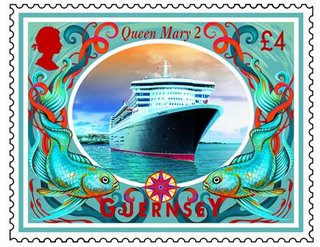Middle class authors at a disadvantage?
Also in today's blog
Barefoot Soldier
The £32 Billion question
Splendid rant about public libraries
Middle class authors
Liz Thomson made an interesting comment in her interview with American crime writer Laura Lippman in the issue of Publishing News dated 12 May which reached me on publication day instead of a week or ten days later as frequently happens when I'm in Spain.
Ms Thomson, who is editor of PN, wrote
"Laura Lippman grew up amid "a very, regular, middle-class background"- which, in many ways, is a disappointment if what you want to be when you grow up is a writer. Without family dysfunction to write about, where would many of the best-selling authors of the last few years be?"
I'll return to this question later. Meanwhile I want to discuss other things I found in Publishing News, read on a bench on St Peter Port's harbour wall to which we often walk down on Sunday mornings. On the Sunday before last there was a thick sea haze over the water and the cruise ship at anchor in the channel called Little Russell, between Guernsey and the islands of Herm and Jethou, was only dimly visible.

Instead of sitting on top of the wall to watch the comings and goings of small boats, we found a more sheltered spot and Mr Bookworm, who had brought a flask of coffee and some wine in his backpack, read a newspaper while I read PN, marking items of interest.
Barefoot Soldier
The first to grab my attention was a feature about Grenada-born Private Johnson Beharry V.C. whose memoir, Barefoot Soldier, written with Nick Cook, [see photo below] is coming out in October. Knowing only about this young man's acts of bravery, I was surprised to read
"…he came to Britain at the age of 19 to better himself. But the UK was not what he thought it would be. Faced with loneliness, disillusionment and isolation, Beharry was seduced by drugs and alcohol. To escape a life that was in danger of careening out of control, he cut off his dreadlocks and joined the British Army."

Last September, the UK newspaper known as the Mirror, ran a story beginning
"When Private Johnson Beharry looked at the contract lying on the table in front of him, he could have been forgiven for reflecting that his life was about to change for ever. With top London literary agent Mark Lucas at his side, Beharry nervously lifted his pen, took a deep breath and began to sign his name. Seconds later, the 26-year-old soldier who once walked barefoot to school in Grenada was a millionaire. His autobiography, Barefoot Soldier, is set to be a bestseller when it is published by Little, Brown next year."
Further down the page I was sorry to read that Beharry, "…separated from Lynthia in May, just 11 days after accepting his VC. His family believes his bravery cost him his marriage." This is particularly sad because, according to reports, he and Lynthia met when they were teenagers and, in my observation, relationships which start very young often have more staying-power than those embarked on later in life.
Looking for a bio of Nick Cook, I found that he is an award-winning defense and aerospace journalist who, for the past 15 years, has been Aviation Editor and Aerospace Consultant of the well-known publication known as Jane's. He has written for most of the best UK newspapers and visited the world's leading defense establishments, gaining access to numerous top secret military facilities and bases in the US and former Soviet Union. "Nick's two hour documentary for the Discovery Channel, “Billion Dollar Secret,” detailed for the first time the secret inner workings of America's classified weapons establishment."
Whether he will be good at dealing with the human side of Beharry's story remains to be seen, but it sounds the kind of book most men and many women will want to read.
The £32 Billion Question

This was the title of a talk by Penguin Marketing and Publicity Director, Joanna Prior, at the recent Booksellers' Association conference. According to PN it made uncomfortable listening for the almost entirely white audience because the question concerns the so-called "brown pound".
Samenua Sesher from the Arts Council's project Decibel is reported to have "attacked genres like 'chick lit' with a line that raised a laugh, but was actually quite barbed. "Where are the people like me in these books?" she asked. "I'm not even 'the friend'."
In 1981, after spending time in Barbados, I wrote a love story called Blue Days At Sea in which the hero and heroine were black journalists, he the editor of a Caribbean island newspaper and she a reporter. I felt there must be a lot of Mills & Boon readers who came from, or had parents or grandparents who came from, the Caribbean. However in the illustration on the jacket of the book, the couple were not as black as my characters which was disappointing.
A number of readers wrote to ask if they were correct in concluding that Lyle and Sarah were black. I wrote back confirming that they were. I had made their racial background perfectly clear short of stating that they were black because I felt this would be as unnatural as stating that white characters were white.
Surely the important thing is that identifying with characters in stories has nothing to do with their skin colour but depends on their occupations and outlooks?
Splendid rant about public libraries by Silverfish
"The following isn't exactly about loving libraries (other than those in my dreams, and those remembered with a fond nostalgia). Still, you've asked us to "Have Our Say"... In my city you can hardly move for cafes, restaurants, and pubs. And, our Central Library being in the heart of the city, many eateries are only a stone's throw away. There are huge numbers of books that are not on our Library shelves. Because they haven't been catalogued. And the reason they haven't been catalogued is because the Library Service can only afford to pay for a cataloguer to come in two days a week. And what is the Library Service spending its money on? A feasibility study to see whether they should be selling coffee and sandwiches. I ask you....! Thirty years ago a post as a Library Assistant was the first rung on the ladder to a worthwhile and satisfying career. Nowadays library assistants are not full-time - not even part-time - but casual employees in a dead-end occupation classified as unskilled manual work that pays little more than the hourly minimum rate, intended for women with absolutely no ambition who have no aims in life other than to earn a little "pin money". Is this feminism or what?"
The whole of this excellent rant, posted by A.Silverfish on May 16, can be read on the Have Your Say page at the Love Libraries campaign website.

Of the three libraries chosen for transformation, I picked Richmond [shown above]because I've been there, although not to the library which, I learn
"…was built in 1880 making it one of the oldest public libraries in London. The library’s significance as a heritage building is recognised in its status as a Grade 2 listed building. It is located at the heart of Richmond in the historic setting of Richmond Green. Inside, the library layout is confusing and there is a sense of clutter and a lack of space and focus. Added to this the library is long over due for a complete re-decoration and re-carpeting to help realise it’s potential as a vibrant centre of books and reading. One of the priorities in the transformation is to put the books at the centre of the library physically and emotionally, reflecting their importance to users…Richmond Library has twelve weeks to undertake a hothouse transformation which will harness the combined skills and energy of library peers, the booktrade, celebrities and the local community."
Middle class authors
Now to get back to the opening para in which I quoted Liz Thomson's comment that being born middle class "is a disappointment if what you want to be when you grow up is a writer. Without family dysfunction to write about, where would many of the best-selling authors of the last few years be?"
It's true that there has been a deluge of misery memoirs and misery novels recently. But isn't this is a manifestation of the much greater number of writers of working class origin who are being published nowadays?
In Julian Fellowes' novel Snobs, mentioned here on 25 December 2005 and borrowed from the library this week, he writes
"The upper classes are not, as a whole, a complaining lot. A brisk walk and a stiff drink are their chosen methods of recovery…it is not their lack of feeling which marks them apart, rather it is lack of expression of feeling. Naturally they do not see this as a failing in themselves and nor do they admire public emotion in others. They are genuinely bewildered by working-class grief, those bereaved mothers being dragged sobbing and supported into church, those soldiers' widows photographed weeping over 'his last letter'. The very word 'counseller' sends a shudder of disgust down any truly well-bred spine. What they do not appreciate, of course, is that these tragedies, national and domestic, the war casualties, the random killings, the pile-ups on the M3, offer most ordinary bereaved what ia probably their only chance of fleeting celebrity. For once in their lives they can appease that very human craving for some prominence…"
To be born in the middle, between the extremes of behaviour of the upper and lower social classes, seems a major advantage for a writer. Browsing my bookshelves, in a vain search for an outstanding American novel written in the last 25 years to send to Beth Quittman, it struck me that, with a few exceptions such as Nancy Mitford, all my favourite writers could be classified as middle class.
